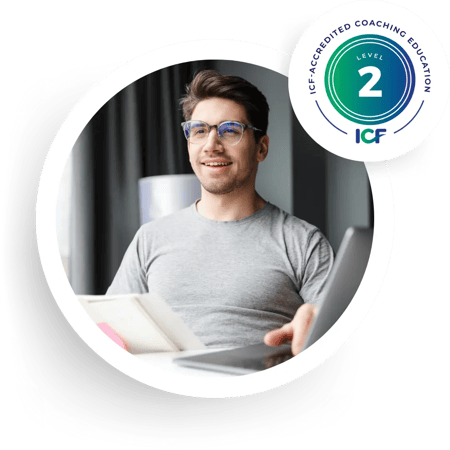Top-Rated ICF-Accredited Coaching Certification Program?
You're in the right place! iPEC's Coach Training Program is research-backed and has been fully accredited by the International Coaching Federation (ICF) since 2002.
Once you successfully complete the program, you'll become a Certified Professional Coach (CPC)—a designation that’s recognized by the ICF—and can count yourself as one of the most thoroughly trained and well-rounded coaches in the world.

Looking for a Top-Rated ICF Accredited Coaching Certification Program?

You're in the right place! iPEC's Coach Training Program is research-backed and fully accredited by the International Coaching Federation (ICF) since 2002.
Once you successfully complete the program, you'll become a Certified Professional Coach (CPC)—a designation that’s recognized by the ICF—and can count yourself as one of the most thoroughly trained and well-rounded coaches in the world.
Our ICF-Accredited Coach Training Program Includes Three Industry-Recognized Certifications:

When you complete the iPEC Coach Training Program, in addition to three certifications you’ll also earn:
67 Professional Development Credits (PDCs) toward SHRM-CP and SHRM-SCP recertification
![]() 70 Credit hours toward HRCI recertification
70 Credit hours toward HRCI recertification
120 Credit hours toward Board Certified Coach (BCC) credential recertification
When you complete the Coaching Fundamentals module, in addition to a Coaching Fundamentals certificate you'll earn:
![]() 27 Professional Development Credits (PDCs) toward SHRM-CP and SHRM-SCP recertification
27 Professional Development Credits (PDCs) toward SHRM-CP and SHRM-SCP recertification
![]() 27 Credit hours toward HRCI recertification
27 Credit hours toward HRCI recertification
Why ICF Accreditation Matters for Coaches
In today's coaching landscape, holding a professional credential—particularly a certification from an ICF-accredited coaching certification program—can really set you apart.
According to the 2022 Global Consumer Awareness Study, 80% of coaching clients deem it crucial or highly important that their coach possesses a credential. Obtaining a coaching certification from an ICF-accredited program not only grants you instant credibility, it also enhances your visibility among potential clients, opening doors to new opportunities and partnerships.
Why ICF Accreditation Matters for Coaches
In today's coaching landscape, holding a professional credential—particularly a certification from an ICF-accredited coaching certification program—can really set you apart.
According to the 2022 Global Consumer Awareness Study, 85% of coaching clients deem it crucial or highly important that their coach possesses a credential. Obtaining a coaching certification from an ICF-accredited program not only grants you instant credibility, it also enhances your visibility among potential clients, opening doors to new opportunities and partnerships.
.webp?width=300&height=300&name=ICF%20circle%20graphic%20(1).webp)
About the International Coaching Federation and Its Requirements
Founded in 1995, the International Coaching Federation (ICF) is the coaching industry’s governing body with many non-profit chapters located around the world. As the global authority on professional coaching, the ICF plays a crucial role in establishing and maintaining high standards within the coaching industry.
While the ICF doesn't offer its own training programs, they do set the gold standard for other coach training programs and lend its seal of approval in the form of accreditation—thereby contributing to the development of competent and skilled coaches worldwide.
For a coach training program to be ICF-accredited, they must undergo a rigorous review process and demonstrate that its curriculum aligns with the ICF definition of coaching, Core Competencies, and Code of Ethics.
By completing an ICF-accredited coaching certification program like ours, you can be confident you’ll graduate having mastered the ICF’s four core competencies for coaches:
- Foundation: Coaches demonstrate ethical behavior, professionalism, and a clear understanding of coaching principles. They establish and maintain appropriate boundaries, confidentiality, and a coaching agreement that outlines the coaching process and goals.
- Co-Creating the Relationship: Coaches establish rapport, demonstrate empathy, and actively engage in building a partnership that allows the client to feel supported and understood. They create a safe and trusting environment where open and honest communication can flourish.
- Communicating Effectively: Coaches use active listening techniques to fully understand the client's thoughts, feelings, and perspectives. They ask powerful questions, use language that resonates with the client, and provide feedback that is constructive and non-judgmental.
- Cultivating Learning and Growth: Coaches help clients increase self-awareness, identify strengths and areas for development, and challenge limiting beliefs or assumptions. They encourage exploration, reflection, and experimentation, promoting continuous learning and sustainable change.
How iPEC Exceeds the ICF Accreditation Requirements
Every three years, the ICF conducts an in-depth audit to ensure every program is upholding the most recent industry standards, and for more than 20 years the iPEC Coach Training Program has earned that seal of approval with each review.

Some ways that iPEC goes beyond the ICF’s coaching curriculum requirements include:
-
The Core Energy Coaching™ methodology that equips you to support others in being the agent of change in their lives and creating the things they most want to experience
-
Access to curriculum hours and materials that significantly exceed the ICF’s already extensive requirements
-
Tools to help prepare you for your coaching career beyond your certification, including a business-building curriculum, coaching specialties library, and opportunities for ongoing education
-
Ample opportunities to practice and gain practical coaching experience beyond the ICF’s standards
-
Success Coaching to help prepare you to understand and engage with your clients on an authentic level
Why Choose iPEC's ICF-Accredited Coach Training Program?
Master a Proven Methodology
Our proprietary Core Energy Coaching™ methodology goes beyond the methods of traditional coaching, offering a proven path for getting to the root of clients’ challenges and creating sustainable transformation. Founded on more than 10,000 hours of research and application over 30 years, this is the foundation of coaching you want.
Get Certified in a Niche of Your Choice
In addition to your foundational training, become an expert in your field of choice and earn an additional certification in one of four sought-after niches. You’ll receive 40 hours of on-demand specialized training, an extra certification, and monthly live webinars—all included in the cost of tuition!
Add the ELI Assessment to Your Toolbox
As an iPEC grad, you’ll be trained and certified to use the Energy Leadership™ Index (ELI) assessment with your clients. The ELI is a research-backed assessment that provides tangible insights into how someone shows up in different areas of their life. As a certified practitioner, you’ll help others facilitate their own increases in self-awareness—and impact the world.
Benefit from Built-In Flexibility
Choose to attend your modules in person in a city near you, or virtually from anywhere in the world! Plus, there are midweek and weekend options so you can choose what fits best with your schedule.
Join a Thriving Global Community
With more than 25,000 iPEC grads around the globe, our community is packed with fellow coaches who have been where you are and who are willing (and eager!) to support you every step of your coaching journey.
Awards and Recognition



Named one of the “11 Assessments Every Executive Should Take” by Forbes, the Energy Leadership Index® (ELI) assessment is a research-backed attitudinal assessment that’s exclusively available for ELI-MP certified iPEC graduates to administer.
Forbes named the iPEC Coach Training Program as one of the Best Life Coach Certification Programs of 2023 in the Forbes Health Best Of 2023 list—with special recognition for “Best for Support After Graduation.”
According to a study conducted by the research firm PayScale, HR professionals who became an iPEC CPC (Certified Professional Coach) were promoted more often than colleagues who had no certifications by 14%. That same group also took home 28% more pay.
Hear What Past Students Have to Say
“I learned how to apply coaching techniques to my organization’s leadership development training, helping me cultivate stronger leaders and drive meaningful change.”
- Pasquale B.
“Not only have I learned the skills I needed to become a great coach, I grew and changed as a human being as well. I am incredibly grateful for the experience and the people I have met through this amazing journey!”
- Susan S.
“iPEC not only changed my career trajectory but it really changed my life, my self-confidence, resilience, and definition of success and happiness. I show up to all aspects of my life as a more thoughtful, caring, and happy person.”
- Piper W.
For Us, ICF Accreditation Was Just the Beginning
In addition to our ICF accreditation, iPEC currently holds the following industry credentials:
-1.png?width=200&height=200&name=HCRI%202023%20(on%20white)-1.png)
HRCI Approved Provider: For more than 45 years, the HR Certification Institute® has stood tall as the premier credentialing organization for the human resource profession.
The use of this official seal confirms that this Activity has met HR Certification Institute’s® (HRCI®) criteria for recertification credit pre-approval.
-1.png?width=200&height=200&name=SHRM%20(on%20white)-1.png)
SHRM-CP & SCP Certified Provider: We are recognized as both Certified and Senior Certified Professionals with the Society for Human Resources Management.
iPEC is recognized by SHRM to offer Professional Development Credits (PDCs) for SHRM-CP® or SHRM-SCP®.
-1.png?width=200&height=200&name=BCC%20(on%20white)-1.png)
CCE Board Certified Coach: iPEC is approved by the Center for Credentialing and Education as a Registered Credential Training Provider.
iPEC has been qualified by the CCE as a Registered Credential Training Provider to provide training courses qualified for credit for eligibility for the Board Certified Coach credential.

What is the difference between ICF-Accreditation and an ICF Credential?
In addition to accrediting coach training programs like the one offered by iPEC, the ICF also offers individual credentialing paths for coaches who choose to pursue them on their own after completing coach training.
-
Associate Certified Coach (ACC): Embarking on the ACC path requires 60 hours of coach-specific education and 100 hours of client coaching experience. This credential signifies a solid foundation and demonstrates a commitment to professional growth.
-
Professional Certified Coach (PCC): The PCC path consists of 125 hours of coach-specific education and 500 hours of client coaching experience. PCC coaches showcase a dedication to honing their skills and making a significant impact in the coaching realm.
-
Master Certified Coach (MCC): Standing as the pinnacle of coaching excellence, MCC coaches must possess or have held a PCC Credential, completed 200 hours of coach-specific education, and amassed 2,500 hours of client coaching experience.
The great news? The training you’ll receive from iPEC includes 200 ICF-accredited training hours . . .
which meets the educational requirements for at least a Professional Certified Coach (PCC) Credential from the ICF.
The great news? The training you’ll receive from iPEC includes 200 ICF-accredited training hours . . .
which meets the educational requirements for at least a Professional Certified Coach (PCC) Credential from the ICF.

